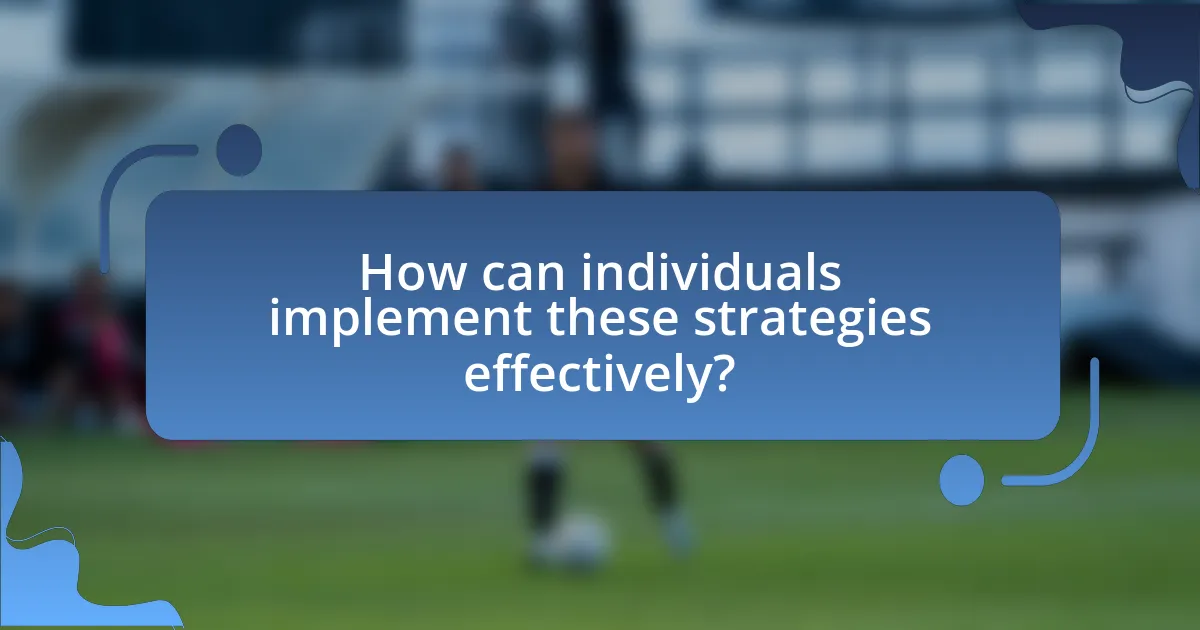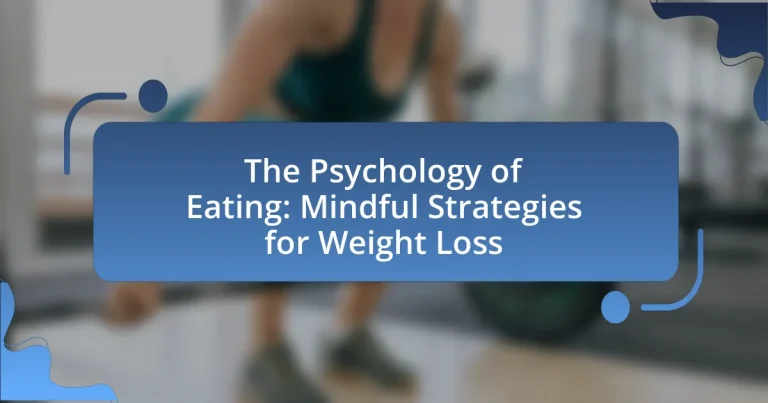The article focuses on the psychology of eating, exploring how psychological factors such as emotions, cognitive beliefs, and social influences shape eating behaviors and food choices. It highlights the impact of emotional states on eating patterns, including emotional eating and restrictive dieting, and emphasizes the importance of understanding these dynamics for effective weight management. The article also discusses mindful eating strategies that enhance self-awareness and promote healthier eating habits, providing practical techniques for individuals to implement in their daily lives. Additionally, it addresses common challenges faced in adopting mindful eating practices and offers resources and tips for maintaining motivation in this journey towards healthier eating.

What is the Psychology of Eating?
The psychology of eating refers to the study of how psychological factors influence eating behaviors, food choices, and dietary habits. This field examines the interplay between emotions, thoughts, and social contexts that affect why and how individuals eat. Research indicates that factors such as stress, mood, and social influences can significantly impact eating patterns, leading to behaviors like emotional eating or restrictive dieting. For instance, a study published in the journal “Appetite” by Herman and Polivy (2008) highlights how emotional states can trigger overeating or undereating, demonstrating the profound connection between psychological states and eating behaviors.
How does the psychology of eating influence our food choices?
The psychology of eating significantly influences our food choices by shaping our perceptions, emotions, and behaviors related to food. Cognitive factors, such as beliefs about health and nutrition, affect what individuals select to eat; for instance, people who believe that certain foods are healthier may choose them over others. Emotional states also play a crucial role; studies show that individuals often eat in response to stress or sadness, leading to choices that may not align with their nutritional goals. Additionally, social influences, such as peer pressure and cultural norms, can dictate food preferences and consumption patterns. Research indicates that mindful eating practices, which encourage awareness of hunger cues and emotional triggers, can lead to healthier food choices and improved weight management.
What psychological factors affect our eating behaviors?
Psychological factors that affect our eating behaviors include emotional states, cognitive beliefs, and social influences. Emotional states, such as stress or sadness, can lead to emotional eating, where individuals consume food to cope with feelings rather than hunger. Cognitive beliefs, including perceptions of food and dieting, can shape eating habits; for example, individuals may restrict their intake based on negative beliefs about certain foods. Social influences, such as peer pressure and cultural norms, also play a significant role in determining what, when, and how much we eat, as evidenced by studies showing that people often mimic the eating behaviors of those around them.
How do emotions impact our relationship with food?
Emotions significantly impact our relationship with food by influencing eating behaviors and food choices. Emotional states such as stress, sadness, or happiness can lead individuals to eat for comfort, reward, or distraction, often resulting in overeating or unhealthy food selections. Research indicates that emotional eating is a common response, with studies showing that approximately 75% of overeating is linked to emotional triggers rather than physical hunger. This connection between emotions and eating can lead to patterns that affect overall health and weight management, as individuals may rely on food to cope with negative feelings instead of addressing the underlying emotional issues.
Why is understanding the psychology of eating important for weight loss?
Understanding the psychology of eating is crucial for weight loss because it influences behaviors, motivations, and emotional responses related to food consumption. Research indicates that psychological factors, such as stress, emotional triggers, and habits, significantly affect eating patterns and choices, which can lead to overeating or unhealthy food selections. For instance, a study published in the journal “Appetite” by Herman and Polivy (2008) highlights how emotional eating can derail weight loss efforts by prompting individuals to consume high-calorie foods in response to negative emotions. Therefore, addressing these psychological aspects can help individuals develop healthier eating habits, improve self-regulation, and ultimately achieve sustainable weight loss.
How can psychological insights lead to healthier eating habits?
Psychological insights can lead to healthier eating habits by enhancing self-awareness and promoting mindful eating practices. Research indicates that understanding emotional triggers and cognitive biases related to food choices allows individuals to make more informed decisions about their diets. For instance, a study published in the journal “Appetite” by Herman et al. (2015) found that individuals who practiced mindfulness while eating reported lower levels of emotional eating and improved dietary choices. This suggests that psychological strategies, such as mindfulness and cognitive restructuring, can effectively alter eating behaviors, leading to healthier habits and weight management.
What role does self-awareness play in weight management?
Self-awareness plays a crucial role in weight management by enabling individuals to recognize their eating habits, triggers, and emotional responses related to food. This recognition allows for informed decision-making regarding dietary choices and lifestyle changes. Research indicates that higher levels of self-awareness are associated with better self-regulation and adherence to weight loss goals, as individuals can identify patterns that lead to overeating or unhealthy choices. For instance, a study published in the journal “Health Psychology” found that participants who practiced self-monitoring and reflected on their eating behaviors were more successful in achieving and maintaining weight loss compared to those who did not engage in such practices.

What are Mindful Strategies for Weight Loss?
Mindful strategies for weight loss include practices that enhance awareness of eating habits and promote healthier choices. These strategies involve techniques such as mindful eating, which encourages individuals to focus on the sensory experience of eating, including taste, texture, and aroma, thereby fostering a deeper connection with food. Research indicates that mindful eating can lead to reduced calorie intake and improved dietary choices, as evidenced by a study published in the journal “Appetite,” which found that participants who practiced mindful eating reported lower levels of binge eating and emotional eating. Additionally, incorporating mindfulness meditation can help individuals manage stress, which is often linked to overeating. By cultivating awareness and presence during meals, individuals can make more intentional decisions about their food consumption, ultimately supporting weight loss goals.
How does mindfulness contribute to healthier eating practices?
Mindfulness contributes to healthier eating practices by enhancing awareness of hunger cues and food choices. This heightened awareness allows individuals to make more intentional decisions about what and how much they eat, reducing impulsive eating behaviors. Research indicates that mindfulness can lead to lower calorie intake and improved food choices, as demonstrated in a study published in the journal “Appetite,” where participants practicing mindfulness reported greater satisfaction and less overeating. By fostering a non-judgmental observation of thoughts and feelings related to food, mindfulness helps individuals develop a more positive relationship with eating, ultimately supporting weight management and overall health.
What techniques can enhance mindfulness during meals?
Techniques that can enhance mindfulness during meals include eating slowly, focusing on the sensory experience of food, and minimizing distractions. Eating slowly allows individuals to better recognize hunger and fullness cues, which can lead to healthier portion control. Focusing on the sensory experience—such as taste, texture, and aroma—can deepen appreciation for food and promote a more satisfying eating experience. Minimizing distractions, such as turning off electronic devices, helps maintain attention on the meal, fostering a greater connection to the food being consumed. Research indicates that these practices can lead to improved eating habits and weight management, as highlighted in studies on mindful eating interventions.
How can mindfulness help in recognizing hunger and fullness cues?
Mindfulness enhances the ability to recognize hunger and fullness cues by promoting awareness of bodily sensations and emotional states related to eating. This practice encourages individuals to focus on their physical sensations, such as stomach growling or feelings of fullness, rather than external distractions or emotional triggers. Research indicates that mindfulness can lead to improved eating behaviors, as evidenced by a study published in the journal “Appetite,” which found that participants who practiced mindfulness reported better awareness of their hunger and satiety signals, leading to healthier food choices and portion control.
What are the benefits of mindful eating for weight loss?
Mindful eating aids weight loss by promoting awareness of hunger and satiety cues, leading to healthier food choices and portion control. This practice encourages individuals to slow down during meals, which can result in reduced calorie intake. Research indicates that individuals who engage in mindful eating techniques tend to consume fewer calories and experience greater satisfaction from their meals. A study published in the journal “Appetite” found that participants who practiced mindful eating reported a significant decrease in binge eating and emotional eating, which are often linked to weight gain.
How does mindful eating reduce emotional eating?
Mindful eating reduces emotional eating by promoting awareness of physical hunger and emotional triggers, allowing individuals to differentiate between genuine hunger and emotional cravings. This practice encourages individuals to slow down, savor their food, and recognize their body’s signals, which can lead to healthier food choices and reduced impulsive eating. Research indicates that mindfulness techniques can decrease binge eating episodes and emotional eating behaviors, as evidenced by a study published in the journal “Appetite” by researchers like Kristine M. M. van Strien, which found that mindfulness training significantly reduced emotional eating in participants.
What evidence supports the effectiveness of mindful eating in weight management?
Mindful eating is supported by evidence indicating its effectiveness in weight management through various studies. Research published in the journal “Obesity” by Kristal et al. (2010) found that participants who practiced mindful eating techniques experienced significant weight loss and improved eating behaviors compared to those who did not. Additionally, a meta-analysis in “Appetite” by D. A. Albers et al. (2014) concluded that mindful eating interventions led to reductions in binge eating and emotional eating, which are critical factors in weight management. These findings demonstrate that mindful eating can enhance awareness of hunger cues and promote healthier food choices, ultimately aiding in weight control.

How can individuals implement these strategies effectively?
Individuals can implement mindful eating strategies effectively by practicing awareness during meals, setting specific eating goals, and maintaining a consistent routine. Awareness involves focusing on the sensory experience of eating, such as taste, texture, and aroma, which can enhance satisfaction and reduce overeating. Setting specific goals, such as portion control or eating without distractions, helps individuals stay accountable and mindful. A consistent routine, including regular meal times and environments conducive to eating, reinforces these strategies. Research indicates that mindful eating can lead to significant weight loss and improved dietary habits, as demonstrated in studies published in journals like “Appetite” and “Health Psychology.”
What practical steps can be taken to practice mindful eating?
To practice mindful eating, individuals can take several practical steps. First, they should focus on eating slowly and without distractions, which allows for better awareness of hunger and fullness cues. Research indicates that eating slowly can lead to reduced calorie intake and increased satisfaction (Wansink & van Ittersum, 2013). Second, individuals can engage their senses by noticing the colors, textures, and flavors of their food, enhancing the eating experience and promoting appreciation for meals. Third, keeping a food journal can help track eating habits and emotional triggers, fostering greater self-awareness. Lastly, practicing gratitude for food can shift the mindset towards a more positive relationship with eating, which has been shown to improve overall eating behaviors (Mason et al., 2016). These steps collectively contribute to a more mindful approach to eating, supporting weight loss and healthier eating patterns.
How can meal planning support mindful eating habits?
Meal planning supports mindful eating habits by encouraging intentional food choices and reducing impulsive eating behaviors. When individuals plan their meals in advance, they are more likely to select nutritious options that align with their dietary goals, fostering a greater awareness of what they consume. Research indicates that structured meal planning can lead to healthier eating patterns, as it allows individuals to reflect on their food preferences and nutritional needs, ultimately promoting a more conscious relationship with food.
What role does environment play in mindful eating practices?
The environment plays a crucial role in mindful eating practices by influencing sensory experiences and emotional responses during meals. A well-structured environment, such as a calm and clutter-free dining space, promotes focus on food, enhancing awareness of hunger and satiety cues. Research indicates that environmental factors, including lighting, noise levels, and the presence of distractions, significantly affect eating behaviors and mindfulness. For instance, a study published in the journal “Appetite” found that individuals eating in a pleasant environment consumed less food and reported greater satisfaction compared to those in a chaotic setting. This evidence underscores the importance of creating a conducive environment to support mindful eating and improve overall eating habits.
What common challenges do people face when adopting mindful eating?
People commonly face several challenges when adopting mindful eating, including distractions during meals, emotional eating triggers, and difficulty in recognizing hunger and fullness cues. Distractions, such as smartphones or television, can lead to mindless consumption, making it hard to focus on the eating experience. Emotional eating often arises from stress or anxiety, causing individuals to eat for reasons other than hunger. Additionally, many struggle to accurately identify their body’s signals for hunger and satiety, which can hinder the practice of mindful eating. Research indicates that these challenges can significantly impact the effectiveness of mindful eating strategies, as highlighted in studies on eating behaviors and mindfulness.
How can individuals overcome obstacles to mindful eating?
Individuals can overcome obstacles to mindful eating by implementing structured strategies such as setting specific meal times, minimizing distractions during meals, and practicing self-awareness regarding emotional triggers for eating. Research indicates that establishing regular meal schedules helps create a routine that promotes mindfulness, as it encourages individuals to focus on their food rather than external stimuli. Additionally, studies show that reducing distractions, such as turning off electronic devices, enhances the ability to savor food and recognize hunger cues. Furthermore, developing self-awareness about emotional eating can empower individuals to differentiate between physical hunger and emotional cravings, leading to more intentional food choices.
What resources are available to support mindful eating practices?
Resources available to support mindful eating practices include books, apps, workshops, and online courses. Books such as “Mindful Eating: A Guide to Rediscovering a Healthy and Joyful Relationship with Food” by Jan Chozen Bays provide foundational knowledge and techniques. Apps like “Eat Right Now” and “Mindful Eating Tracker” offer guided practices and tracking features to enhance mindfulness during meals. Workshops and online courses, often provided by nutritionists or mindfulness coaches, facilitate group learning and personal growth in mindful eating habits. Research indicates that these resources can significantly improve individuals’ awareness of their eating habits and promote healthier choices, as evidenced by studies published in journals like “Appetite” and “Mindfulness.”
What are some tips for maintaining motivation in mindful eating?
To maintain motivation in mindful eating, individuals should set clear, achievable goals that align with their personal values and health objectives. Establishing specific intentions, such as eating without distractions or savoring each bite, reinforces commitment to the practice. Research indicates that tracking progress through journaling or using apps can enhance accountability and provide insights into eating patterns, thereby sustaining motivation. Additionally, cultivating a supportive environment by sharing goals with friends or joining mindful eating groups can foster encouragement and accountability, making it easier to stay motivated.


